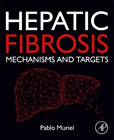
Hepatic Fibrosis: Mechanisms and Targets is a complete volume of liver extracellular matrix biology, including molecular signaling pathways, cells and factors that modulate fibrogenesis and fibrosis. The book uses an integrated approach toward the molecular and cellular mechanisms involved in the synthesis and degradation of hepatic fibrotic tissue, emphasizing the possible molecular targets to fight fibrosis. This important reference describes, in detail and didactically, the cellular and molecular events that are conducive to fibrosis that leads to cirrhosis, hepatocellular carcinoma and death. The provided information allows readers to understand the molecular mechanisms of hepatic fibrogenesis to accelerate the development of new therapies. Presents progression from inflammation to fibrosis, with a special focus on the molecular mechanisms involved Didactically explains the participation of cells, cytokines and factors in profibrogenic pathways Illuminates the causative participation of free radicals in liver fibrogenesis Explains the role of gut dysbiosis in chronic liver diseases leading to fibrosis Provides experimental models to study liver fibrosis and describes available, noninvasive monitoring methods INDICE: 1. Healthy and diseased extracellular matrix of the liver 2. From inflammation to fibrosis 3. Cells, cytokines, and factors involved in profibrogenic pathways 4. Role of free radicals in hepatic fibrogenesis 5. Role of gut dysbiosis in chronic liver disease leading to fibrosis 6. Alcohol-induced fibrosis 7. From fatty liver to nonalcoholic steatohepatitis with fibrosis 8. Viral hepatitis-induced liver fibrosis 9. Biliary fibrosis 10. Experimental models of hepatic fibrosis 11. Monitoring hepatic fibrosis
- ISBN: 978-0-323-99764-5
- Editorial: Academic Press
- Encuadernacion: Rústica
- Páginas: 250
- Fecha Publicación: 01/06/2022
- Nº Volúmenes: 1
- Idioma: Inglés
